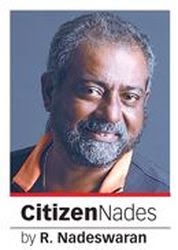Easy to catch the corrupt

First of all, the Malaysian Anti-Corruption Commission (MACC) can only compel someone to declare his assets. Once the assets are declared, there is no offence.
R. Nadeswaran, The Sun Daily
UNTIL October 2006, few people outside political circles knew him. He rose from an obscure railway gatekeeper staying in a one-room quarters at the railway crossing where he was required to raise the barriers to allow vehicular traffic to flow after the trains had passed by.
By the time theSun front-paged the story on his “meteoric rise” and his “palace” which he had built on land meant for low-cost housing, his positions in the party and as a state assemblyman were hanging by a thread.
The late Zakaria Mat Deros (God bless his soul) gained notoriety for building his 16-bedroom house without even submitting building plans. He had not paid the assessment for 12 years on two low-cost units previously occupied by his large family.
So, last week nostalgia came back when the Ikan Bakar man took journalists on a helicopter ride to show the “palace” of a politician – a divisional youth leader in the opposition.
Preceding this, Crime Watch supremo alleged that the inspector-general of police had himself built yet another “palace” in Mantin.
The accusers in both instances asked the relevant authorities to investigate them alleging that they must explain how they got the money to acquire such property.
This prompted a Facebook user to suggest in jest that he wants partners to start a helicopter service for aerial tours to pick out mansions of politicians. In banter, I offered my services and reasoned that I had a good track record.
Over the years, I have come across several ordinary cikgu who became millionaires after their foray into politics. There are scores of “politically connected people” (to borrow a term that has now become the new mantra for banks and bankers) living in similar luxury.
There are also good people who stepped into the dark side unable to resist their own temptation or that of their wives to lead different lifestyles and keep up with the Joneses. There are some female golfers who even have golf bags to match the colour of their attire.
Then there’s the average man who is turned over because he can’t make ends meet on his meagre salary and many dependants. But the law does not differentiate between the poor, the middle class and the rich. Perhaps, such a factor could be pleaded in mitigation for a lighter sentence.
I have been repeatedly told that being rich or wealthy does not constitute an offence.
An offence only takes place if the money is obtained illegally – corruption, money laundering, criminal breach of trust, cheating and the like.
Asking the authorities to investigate the source of the money is dangerous territory full of mine fields and cluster bombs.
First of all, the Malaysian Anti-Corruption Commission (MACC) can only compel someone to declare his assets. Once the assets are declared, there is no offence.
Second, if he or she is caught with the cash or money in the bank, a non-acceptable explanation would lead to charges of money-laundering – NOT corruption; not getting assets through corruption; not getting money from illegal activities.
We had the perfect opportunity to put it right when former prime minister Tun Abdullah Ahmad Badawi promulgated the Malaysian Anti-Corruption Commission Act to replace the outdated Anti-Corruption Act towards the end of his tenure.
In the proposals was a clause which stated: “It shall be an offence of any person to lead a lifestyle or possess assets which are disproportionate to his or her declared income.”
By the time this legislation was presented as a bill in Parliament, this clause had been removed from the original draft. We were then told that several “warlords” within the system opposed the clause because they themselves would have to account for their wealth!
So, instead of putting the onus on the official suspected of corruption to prove he earned the money legitimately, the prosecution has to prove that he had received a gratification. That is difficult because corruption is a victimless crime. Both giver and taker benefit and one usually will not squeal on the other.
In the absence of such legislation, the prosecution usually files money laundering charges. But the core issue of proving that he or she was a corrupt person through the legal process becomes almost impossible. In such circumstances, it leaves Joe Public’s imagination to run wild as to the source of the wealth.
Under these circumstances, shouldn’t that catch-all clause be re-visited with a view to tightening our anti-corruption laws? Hong Kong has been successful in its fight because such a clause in its legislation empowers officers from the Independent Commission Against Corruption to serve notice demanding explanations from suspected corrupt officials.
If they fail to provide a plausible or satisfactory account of their wealth, they are prosecuted. A few like-minded lawyer-friends had a discussion on this and came to the conclusion that if this clause is incorporated, our prisons would be overcrowded.
R. Nadeswaran had the benefit of seeing the “new” legislation before and after it was presented and passed in Parliament. Comments: [email protected]

